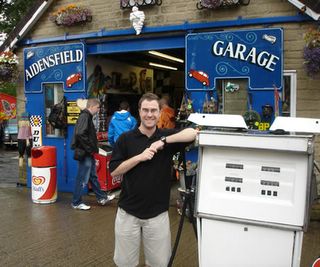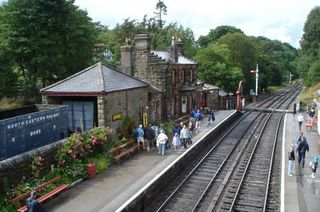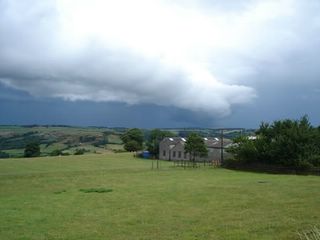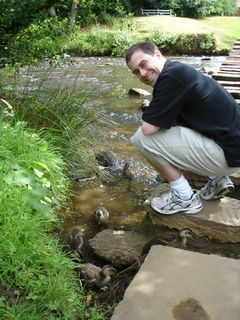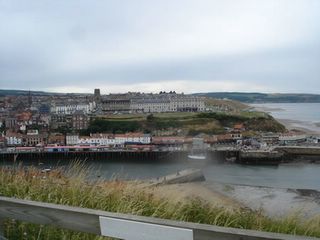Just back from the Eastern coast of North Yorkshire lies the Esk Valley, named after the river that runs through it.
The Esk river winds its way through the valley before meeting the sea at Whitby.
The valley is a picturesque part of the world with many little towns.
We spent a day travelling along the valley, starting at the northern end, which is towards Middlesbrough. During our travels we walked an old Roman road, which is easily found just north of Goathland.
Goathland is famous as the setting for the town of Aidensfield in the TV show 'Heartbeat'. During a heavy rainstorm we took shelter in the Aidensfield Garage, which these days doubles as a tourist trap.
The town also has a famouse train station, which has also been used in the 'Heartbeat' series and has doubled as the train station for Hogwart's School in the Harry Potter films.
During our travels we also came across a small town called Lealholm. To cross the river Esk at Lealholm you can either go over the road bridge or via a series of stepping stones, which appear to have been in existence for many years.
While making our crossing of the river a family of ducks greeted us and were more than happy to wander through the three of us as we stood on the river bank. We were able to take many photos of the ducks.
Unfortunately the weather closed on us while we were at Goathland and while we made it to Robin Hood's Bay, south of Whitby in the late afternoon, any plans for an extensive walk were quickly forgotten in the driving rain.
"Life is like a box of chocolates, you never know what you're gonna get". A diary of the life and times of Peter and Natalie Vasey.
Monday, August 07, 2006
Whitby
So what was Whitby like?
It was very pretty.
The land rises rapidly from the sea, before dropping into the valley through which the Esk river flows. After that it rises again into the moors. These are a very odd place to look at. The folliage of the plants growing in that area seemed to be almost purple.
Whitby itself is very nice but you always seem to be heading up or down hills.
At night the gulls are very loud. The parking in the centre of the town, especially around the blocks containing B&Bs, is at a premium, and the weather seemed changeable. But these are the only down sides.
There is plenty of fish and chips to be had, much of it apparently caught locally. The food seems inexpensive and of good quality and there are lots of little shops to explore.
For me is was great to see where some of my ancestors lived. Following discussions with the local heritage society, I know that there are Vaseys buried in the local cemetary and I am sure I will be heading back to the town to do further investigations in the future.
Of course, Whitby is also where Captain Cook spent a number of years before setting off on his trip to find Australia. The Endeavour was actually a locally built ship.
It was very pretty.
The land rises rapidly from the sea, before dropping into the valley through which the Esk river flows. After that it rises again into the moors. These are a very odd place to look at. The folliage of the plants growing in that area seemed to be almost purple.
Whitby itself is very nice but you always seem to be heading up or down hills.
At night the gulls are very loud. The parking in the centre of the town, especially around the blocks containing B&Bs, is at a premium, and the weather seemed changeable. But these are the only down sides.
There is plenty of fish and chips to be had, much of it apparently caught locally. The food seems inexpensive and of good quality and there are lots of little shops to explore.
For me is was great to see where some of my ancestors lived. Following discussions with the local heritage society, I know that there are Vaseys buried in the local cemetary and I am sure I will be heading back to the town to do further investigations in the future.
Of course, Whitby is also where Captain Cook spent a number of years before setting off on his trip to find Australia. The Endeavour was actually a locally built ship.
Friday, August 04, 2006
Yorkshire
We have just returned from a trip to Yorkshire.
Natalie, Tim and myself travelled up on Sunday morning and we left Whitby on Wednesday morning.
Whitby, on the East coast, was home to my great-grandfather when he was young. We attempted to find out more about him through a local Whitby heritage society. Hopefully they will come through with the goods.
Aside from travelling around Whitby and taking in fish and chips and a few local ales, we travelled through the Esk Valley (which is home to the local river, the Esk) and a place called Goathland. This is better known as Aidensfield from the TV show 'Heartbeat'.
The weather chased us home yesterday. Firstly we headed for York. Spending almost two hours there and seeing such things as the York Minster, the ruins of the York Abbey (Henry VIII has alot to answer for, but more on that later), and various other historical buildings we made it back to the car just as the heavens opened.
We drove out of the rain as we headed south to Sheffield. But by the time we had completed our late lunch the rain was getting heavy in the city of Tim's grandfather.
Leaving Sheffield, we drove through heavy rain on the motorway as we headed south. At times visibility was down to well under 200m. This was partly due to the heavy rain and the spary from the cars on the road. We eventually drove out of the rain just north of Rugby.
All in all, however, the weather has been very kind to us and we have enjoyed the first part of our summer holidays. Over the coming days we are travelling in and around London and taking in the first home game for the new football season at Queens Park Rangers.
Henry VIII
What was wrong with Henry VIII? As we found out while touring around the once magnificent Whitby Abbey, When Henry decided to pull away from the Roman Catholic church, we also decided to have every abbey in England valued. This allowed him to ransack and pillage the valuables from the abbeys and kick the monks out. He did this at both Whitby and York. All that's left today are ruins which only give you some idea of how impressive the original structures were.
Natalie, Tim and myself travelled up on Sunday morning and we left Whitby on Wednesday morning.
Whitby, on the East coast, was home to my great-grandfather when he was young. We attempted to find out more about him through a local Whitby heritage society. Hopefully they will come through with the goods.
Aside from travelling around Whitby and taking in fish and chips and a few local ales, we travelled through the Esk Valley (which is home to the local river, the Esk) and a place called Goathland. This is better known as Aidensfield from the TV show 'Heartbeat'.
The weather chased us home yesterday. Firstly we headed for York. Spending almost two hours there and seeing such things as the York Minster, the ruins of the York Abbey (Henry VIII has alot to answer for, but more on that later), and various other historical buildings we made it back to the car just as the heavens opened.
We drove out of the rain as we headed south to Sheffield. But by the time we had completed our late lunch the rain was getting heavy in the city of Tim's grandfather.
Leaving Sheffield, we drove through heavy rain on the motorway as we headed south. At times visibility was down to well under 200m. This was partly due to the heavy rain and the spary from the cars on the road. We eventually drove out of the rain just north of Rugby.
All in all, however, the weather has been very kind to us and we have enjoyed the first part of our summer holidays. Over the coming days we are travelling in and around London and taking in the first home game for the new football season at Queens Park Rangers.
Henry VIII
What was wrong with Henry VIII? As we found out while touring around the once magnificent Whitby Abbey, When Henry decided to pull away from the Roman Catholic church, we also decided to have every abbey in England valued. This allowed him to ransack and pillage the valuables from the abbeys and kick the monks out. He did this at both Whitby and York. All that's left today are ruins which only give you some idea of how impressive the original structures were.
Subscribe to:
Comments (Atom)
